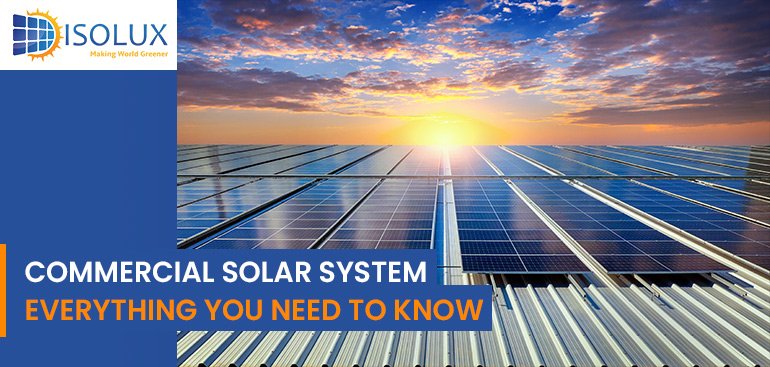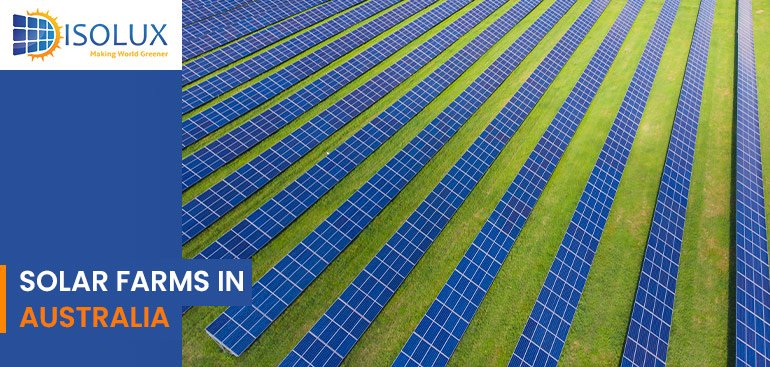Commercial solar energy is becoming an increasingly popular choice for businesses looking to reduce their carbon footprint, lower energy costs, and contribute to a more sustainable future. In this blog, we will explore the ins and outs of the commercial solar system in Sydney, from understanding its concept to choosing the right solar system for your business.
What is a Commercial solar system
Commercial solar refers to the utilization of solar energy systems in commercial buildings and establishments. It involves the installation of solar panels on rooftops or open spaces to harness the sun’s energy and convert it into electricity. This renewable energy source offers numerous benefits and has the potential to transform the way businesses consume and generate power.
How Commercial Solar Power Works
Commercial solar power systems are designed to generate electricity for businesses, institutions, or industrial facilities. Here’s an overview of how they work:
- Solar Panels Capture Sunlight:
Solar panels, typically mounted on rooftops, ground mounts, or carports, absorb sunlight. They use photovoltaic (PV) cells to convert sunlight into direct current (DC) electricity. - Inverters Convert DC to AC:
The electricity generated by the panels is in DC form, which isn’t suitable for most commercial equipment. Inverters convert DC electricity into alternating current (AC), which powers buildings and equipment. - Electricity Distribution:
The converted AC electricity is distributed throughout the building to power lights, machinery, HVAC systems, and other operational needs. - Excess Power Management:
- On-Grid Systems: Excess electricity is sent back to the grid, and businesses may receive credits through a process called net metering.
- Off-Grid Systems: Extra energy is stored in batteries for later use.
- Hybrid Systems: Combine grid connection and battery storage to optimize energy use and reliability.
- Monitoring Systems:
Advanced monitoring tools track system performance, energy production, and consumption, helping businesses maximize efficiency. - Cost Savings:
By generating their own electricity, businesses can reduce dependency on grid power, leading to significant savings on energy bills.
Which Type of Solar Panel is Best for Commercial Use?
The best type of solar panel for commercial use depends on specific needs, but here are the most commonly used types:
- Monocrystalline Solar Panels:
- Efficiency: High (15–22%)
- Best For: Limited space, as they produce more power per square foot.
- Durability: Long-lasting and aesthetically pleasing.
- Polycrystalline Solar Panels:
- Efficiency: Moderate (13–16%)
- Best For: Large-scale projects with ample installation space.
- Durability: Robust but slightly less efficient than monocrystalline panels.
- Thin-Film Solar Panels:
- Efficiency: Lower (10–12%)
- Best For: Large commercial roofs that may not support heavier panels.
- Flexibility: Lightweight and adaptable to unique roof shapes.
Components of a Commercial Solar Power System
A commercial solar power system consists of several key components, each playing a critical role in generating, managing, and distributing solar energy.
1. Solar Panels
- Purpose: Capture sunlight and convert it into direct current (DC) electricity.
- Types:
- Monocrystalline: High efficiency and compact.
- Polycrystalline: Cost-effective for larger installations.
- Thin-Film: Lightweight and flexible.
- Placement: Rooftops, ground mounts, or solar carports.
2. Inverters
- Purpose: Convert DC electricity from solar panels into alternating current (AC), which is usable by most electrical systems.
- Types:
- String Inverters: Connect multiple panels in a series.
- Microinverters: Attached to individual panels for optimized performance.
- Central Inverters: Used in large-scale systems for centralized energy conversion.
3. Mounting and Racking Systems
- Purpose: Secure solar panels in place while maximizing exposure to sunlight.
- Types:
- Fixed Tilt Mounts: Set at a specific angle for optimal sun exposure.
- Tracking Systems: Adjust angles throughout the day to follow the sun, increasing efficiency.
4. Energy Storage Systems (Optional)
- Purpose: Store excess electricity generated during peak sunlight hours for use during cloudy periods or at night.
- Common Storage Systems:
- Lithium-ion batteries (e.g., Tesla Powerwall)
- Flow batteries
- Lead-acid batteries
5. Power Meters
- Purpose: Measure energy production and usage, providing data for system monitoring and billing.
- Functionality: Track the amount of electricity fed back to the grid (for net metering) or stored in batteries.
6. Charge Controllers (Optional)
- Purpose: Regulate the flow of electricity to prevent overcharging of batteries in systems with energy storage.
7. Monitoring Systems
- Purpose: Track real-time energy production, system performance, and potential issues.
- Features: Accessible via software platforms or mobile apps for easy analysis and maintenance.
8. Electric Grid Connection (For Grid-Tied Systems)
- Purpose: Facilitate energy exchange between the solar power system and the local utility grid.
- Benefits: Enables net metering and acts as a backup power source when solar energy is insufficient.
9. Safety and Electrical Components
- Purpose: Ensure safe operation and distribution of electricity.
- Components Include:
- Breakers
- Disconnect switches
- Surge protectors
- Wiring and conduit
10. Solar System Controller (Optional)
- Purpose: Manage hybrid systems by balancing energy usage between solar panels, batteries, and the grid.
Each of these components must be selected, installed, and maintained with care to ensure optimal performance and cost-efficiency in a commercial solar power system. Consulting with a Isolux Solar to customize the setup based on energy requirements, budget, and site conditions.
Benefits of Commercial Solar Panel System
Cost Savings: One of the key advantages of commercial solar is the potential for significant cost savings on electricity bills. By generating your own electricity, you can reduce reliance on traditional energy sources and their associated costs. Over time, the savings can be substantial, allowing businesses to allocate resources to other areas of operation.
Environmental Impact: Commercial solar plays a crucial role in reducing greenhouse gas emissions and mitigating climate change. By utilizing clean and renewable energy, businesses can significantly lower their carbon footprint and contribute to a more sustainable future. Choosing solar power demonstrates environmental responsibility and enhances your brand image.
Energy Independence: Investing in a commercial solar system grants your business a certain level of energy independence. By generating your own electricity, you are less vulnerable to fluctuations in energy prices and supply. This stability can be particularly advantageous during times of high demand or grid disruptions.
Financial Incentives: Governments and local authorities often provide financial incentives to encourage businesses to adopt solar energy. These incentives can come in the form of tax credits, grants, or favorable financing options. Taking advantage of these programs can further enhance the financial viability of commercial solar.
Types of Commercial Solar Systems
When considering commercial solar, it’s essential to understand the different types of solar systems available. The most common ones include:
On-Grid Systems: On-grid commercial solar systems are connected to the local power grid. They allow businesses to offset their electricity consumption by feeding excess power back into the grid. This interaction with the grid ensures a stable power supply even when solar generation is low.
Off-Grid Systems: Off-grid commercial solar systems operate independently from the power grid. They are typically used in remote locations where access to the grid is limited or costly. These systems incorporate energy storage solutions, such as batteries, to store excess electricity for use during periods of low solar generation.
Hybrid Systems: Hybrid commercial solar systems combine the features of both on-grid and off-grid systems. They are connected to the grid but also incorporate energy storage capabilities. Hybrid systems offer the flexibility of utilizing solar power while providing backup power during grid outages.
How to Choose a Commercial Solar Power System in Sydney
Selecting the right commercial solar power systems for your business requires careful consideration of several factors:
Energy Needs: Assess your business’s energy consumption patterns and requirements. This evaluation will help determine the size and capacity of the solar system needed to meet your energy demands effectively.
Available Space: Evaluate the available space on your premises for solar panel installation. Rooftop systems are a popular choice, but if space is limited, ground-mounted systems or solar carports can be viable alternatives.
Budget: Consider your budgetary constraints and the return on investment you expect from the solar system. Determine the payback period and evaluate financing options to make an informed decision.
Quality and Warranty: Research reputable commercial solar panel installers near you and review the quality and warranty offered by different manufacturers. Choosing high-quality components ensures the longevity and performance of your solar system.
Conclusion
Commercial solar offers businesses a multitude of benefits, ranging from cost savings to environmental impact. Understanding the concept of commercial solar, exploring its advantages, and selecting the right solar system are crucial steps toward harnessing the power of the sun for your business’s energy needs. Embracing solar energy not only supports sustainable practices but also positions your business as a responsible leader in the transition to a clean energy future.
For any queries or installation quotes, contact Isolux Solar for smart commercial solar solutions.
FAQ
Which Type of Solar Panel is Best for Commercial Use?
Monocrystalline solar panels are highly recommended for commercial use due to their superior efficiency and suitability for larger energy systems. These panels are also flexible and can be utilized for smaller installations as well, making them a versatile choice for commercial properties seeking optimal energy production and cost savings.
How Many kW is a Commercial Solar Panel?
A commercial solar panel typically has a capacity ranging from 30 to 100 kW. These mid-sized installations are commonly found in medium-sized offices, clubs, and retail shops. It’s important to work with a commercial solar specialist as these systems require additional components and expertise.
How Efficient is a Commercial Solar Panel?
Monocrystalline solar panels are the most efficient commercial option, boasting an efficiency range of 15% to 22%. In comparison to polycrystalline and thin-film panels, monocrystalline panels have the highest level of efficiency. Invest in monocrystalline solar panels for maximum energy generation and cost savings.
Read Next Blog:




